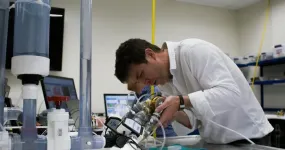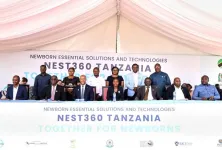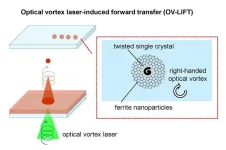(Press-News.org) While chemotherapy has advanced in personalization, personalized radiation therapy for cancer remains underdeveloped. Current cancer treatment methods – including radiation therapy – are intricate, lack personalization, and rely heavily on the expertise of medical teams. Medical image analysis and machine learning hold great promise for enhancing personalized oncology. However, challenges persist such as limited high-quality data and data complexity.
Wazir Muhammad, Ph.D., principal investigator and an assistant professor in the Department of Physics within Florida Atlantic University’s Charles E. Schmidt College of Science, has received a $701,000 grant from Precess Medical Derivatives, Inc., a company that specializes in providing an array of medical physics services and designing and developing software applications, for a project that aims to revolutionize cancer treatment by making it more personalized and effective.
The project, “Deciphering Digital Twins of Cancer Patients for Personalized Treatments,” uses artificial intelligence, in particular, deep reinforcement learning (DRL), to analyze multimodal data, and enhance cancer characterization and treatment to ultimately improve patient outcomes.
“Using personal health data, genetic information about the tumor, and patient treatment and follow-up data, digital twins will simulate diagnoses and treatment options to help physicians choose the most effective treatments and monitor responses over time,” said Muhammad.
The project will help to address the challenges of data quality, complexity and integration into clinical workflows.
DRL represents a powerful approach in leveraging data-driven decision-making in health care, though its application requires careful consideration of ethical, safety, and interpretability concerns specific to medical contexts. Although AI shows promise in advancing personalized cancer treatment, integration into routine clinical use requires overcoming these significant technical and ethical hurdles.
“In oncology or medical applications, deep reinforcement learning can be used to optimize treatment strategies by learning from patient data and adapting treatment plans based on observed outcomes,” said Muhammad. “It also can aid in personalizing treatments by considering individual patient characteristics and predicting the effectiveness of different interventions.”
The project will create a prototype of a dynamic digital twin of cancer patients to better understand and treat cancer. The digital twin will use observational data to represent the patient’s current state and predict future transitions. It will combine simulation, model inference, data assimilation and high-performance computing to connect scales and processes.
“The goal of the model is to provide optimized treatment plans, aid diagnosis and follow-up, and draw on patients’ data including health history, cancer histology, genomic and molecular profiling, prior treatment history, and radio-sensitivity index to improve patient outcomes,” said Muhammad.
Creating a patient-specific digital twin for oncology patients requires a large, coordinated effort among physicians, radiologists, medical physicists, modelers, clinicians, computational scientists, and software engineers. The three-year project will entail developing a process to anonymously collect, categorize and analyze patients’ multimodal data; build DRL models; and evaluate digital twins against standard protocols.
The creation of the digital twin in oncology will follow a structured five-step process that includes the model design, personalization, testing, refinement and validation, and continuous improvement.
“Importantly, if this project is successful, it could help to close health disparities gaps between different geographic or demographic groups,” said Muhammad.
The American Cancer Society estimates more than 2 million new cancer cases in 2024. Approximately 50% of all cancer patients in the U.S. receive radiation therapy as part of their treatment regimen.
“This consequential grant awarded to Dr. Muhammad is an important investigation into the development of personalized radiation treatment and will serve to empower health care providers to tailor therapies to each patient’s unique cancer profile,” said Valery Forbes, Ph.D., dean, FAU Charles E. Schmidt College of Science. “This novel approach holds promise to enhance treatment efficacy as well as minimize side effects, ultimately improving outcomes and quality of life for individuals battling cancer.”
- FAU -
About Florida Atlantic University:
Florida Atlantic University, established in 1961, officially opened its doors in 1964 as the fifth public university in Florida. Today, the University serves more than 30,000 undergraduate and graduate students across six campuses located along the southeast Florida coast. In recent years, the University has doubled its research expenditures and outpaced its peers in student achievement rates. Through the coexistence of access and excellence, FAU embodies an innovative model where traditional achievement gaps vanish. FAU is designated a Hispanic-serving institution, ranked as a top public university by U.S. News & World Report and a High Research Activity institution by the Carnegie Foundation for the Advancement of Teaching. For more information, visit www.fau.edu.
END
HOUSTON and MIAMI ― The University of Texas MD Anderson Cancer Center and Summit Therapeutics, Inc. today announced a strategic five-year collaboration agreement for the purpose of accelerating the development of ivonescimab.
Leveraging MD Anderson’s clinical infrastructure and research expertise together with Summit’s innovative, investigational, potential first-in-class PD-1/VEGF bispecific antibody, the collaboration is designed to quickly discover additional opportunities for ivonescimab, including several tumors outside of its current development plan. MD Anderson will lead multiple clinical trials in several tumor types to evaluate the safety and potential clinical ...
Scientists have known from ice core research that it's easier to melt an ice sheet than to freeze it up again. Now, they know at least part of the reason why, and it has to do with ice's "sponginess," according to a new study published July 24 in The Cryosphere.
The study uses a physics-based numerical model to assess the impacts of warming and cooling on firn, the porous layer between snow and glacial ice, over the entire Greenland Ice Sheet. Megan Thompson-Munson, a CIRES and ATOC PhD student, led the study alongside ...
Houston, Texas, July 25, 2024 – The Texas Heart Institute (THI) and BiVACOR®, a clinical-stage medical device company, announced today the successful first-in-human implantation of the BiVACOR Total Artificial Heart (TAH) as part of the U.S. Food and Drug Administration (FDA) Early Feasibility Study (EFS) on July 9, 2024. BiVACOR’s TAH is a titanium-constructed biventricular rotary blood pump with a single moving part that utilizes a magnetically levitated rotor that pumps the blood and replaces both ventricles of a failing heart.
The first-in-human clinical ...
University of Washington Researchers Take Flight with New Insights on Bat Evolution
Video Interview with Authors - https://youtu.be/6rogrh2_HN0
In new research published in PeerJ Life & Environment, researchers from the University of Washington, University of Texas at Austin and Oregon Institute of Technology, led by undergraduate student Abby Burtner, have advanced our understanding of the evolutionary origins of flight in bats. The study, titled "Gliding toward an Understanding of the Origin of Flight in Bats," employs phylogenetic comparative methods to explore the evolutionary transition from gliding to powered flight in these unique mammals.
Bats ...
HOUSTON – (June 25, 2024) – Rice University President Reginald DesRoches joined Rice360 Institute for Global Health Technologies Co-Director Maria Oden and Rice360 supporters on a trip to Africa this summer marking significant milestones on the road to ending preventable newborn deaths in the sub-Saharan region. Rice360 is one of 22 organizations in the Newborn Essential Solutions and Technologies (NEST360) international alliance, and this trip signified Rice’s continued collaboration ...
4D Medicine, a spin-out from the Universities of Birmingham and Warwick has raised £3.4m ($4.4m) in a Series A investment.
The funding round was backed by Oshen Holdings, DSW Ventures, SFC Capital, Boundary Capital and private investors including several leading scientists and surgeons. It will enable the company to complete pre-clinical testing of its first product range and seek FDA clearance for entry into the US market.
4D is a UK-based company whose innovative biomaterial has potential to be used for a wide range of 3D printed implants and surgical devices. Its product 4Degra is a resorbable biomaterial that is being used to develop ...
The findings, published today in Nature Ecology & Evolution, sheds light on some core principles of the evolution of modern biodiversity.
In current oceans, molluscs such as clams, oysters, and snails are hugely diverse, with over 50,000 species, whereas brachiopods are rare by comparison with only 394 species known. But this was not always the case. The team have found that brachiopods were evolving new shell shapes and ecological behaviours following the end-Permian mass extinction which compromised their numbers.
“In the Palaeozoic, from 540 to 250 million years ago, brachiopods ruled the seabed,” ...
In a scientific breakthrough, an international research team from Germany's Forschungszentrum Jülich and Korea's IBS Center for Quantum Nanoscience (QNS) developed a quantum sensor capable of detecting minute magnetic fields at the atomic length scale. This pioneering work realizes a long-held dream of scientists: an MRI-like tool for quantum materials.
The research team utilized the expertise of bottom up single-molecule fabrication from the Jülich group while conducting experiments at QNS, utilizing the Korean team’s leading-edge ...
PISCATAWAY, NJ – Probably everyone has heard the conventional wisdom that a glass of wine a day is good for you--or you’ve heard some variation of it. The problem is that it’s based on flawed scientific research, according to a new report in the Journal of Studies on Alcohol and Drugs.
Over the years, many studies have suggested that moderate drinkers enjoy longer lives with lower risks of heart disease and other chronic ills than abstainers do. That spurred the widespread belief that alcohol, in moderation, can be a health tonic. However, not all studies have painted such a rosy picture--and the ...
The proliferation of all things digital doesn’t mean that printing technology is no longer relevant. In fact, printing technology is required to make the semiconductors necessary for the digital world. And as an Osaka Metropolitan University-led team has shown using a new printing technique, printable magnetic devices for high-density data storage might soon be realized.
Dr. Ken-ichi Yuyama, a lecturer at the Graduate School of Science, and his colleagues report in APL Materials on the development of a new type of laser-induced forward transfer ...








